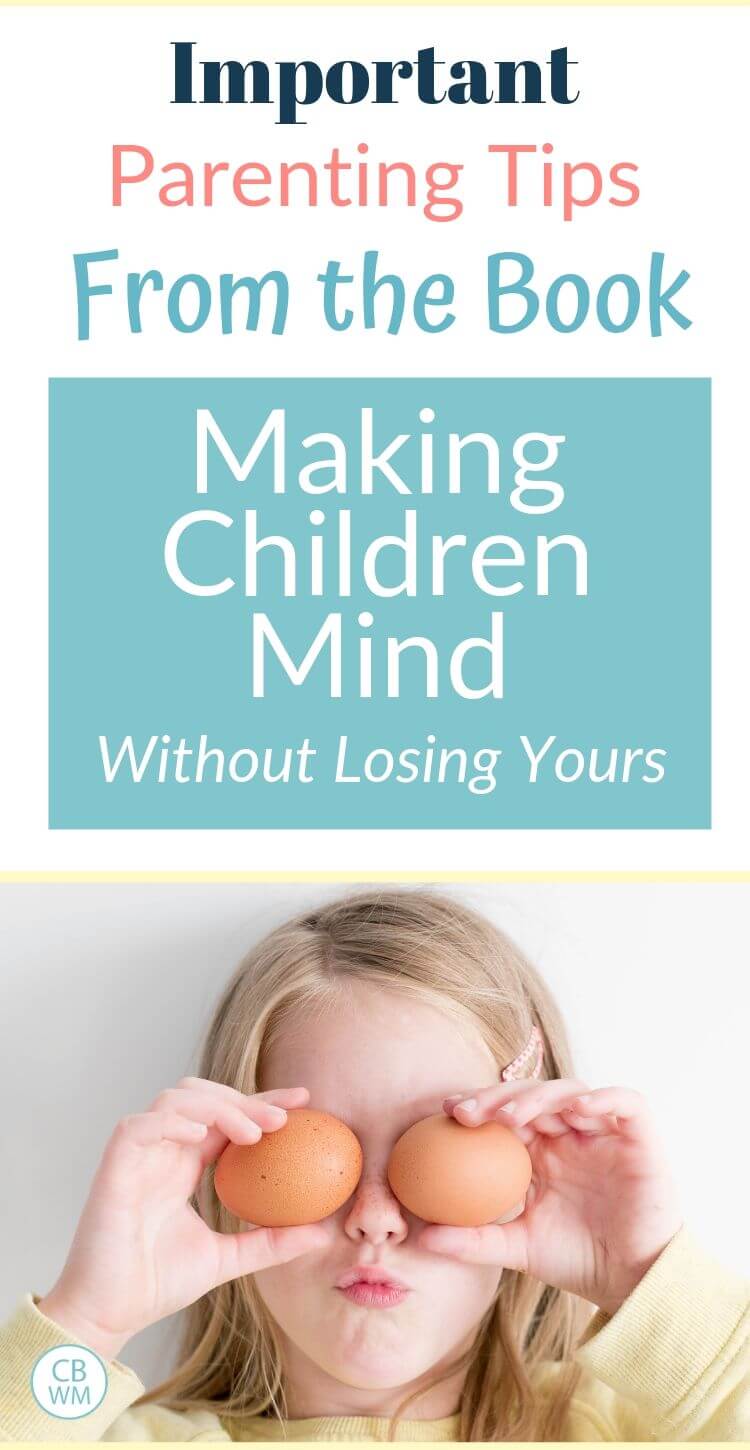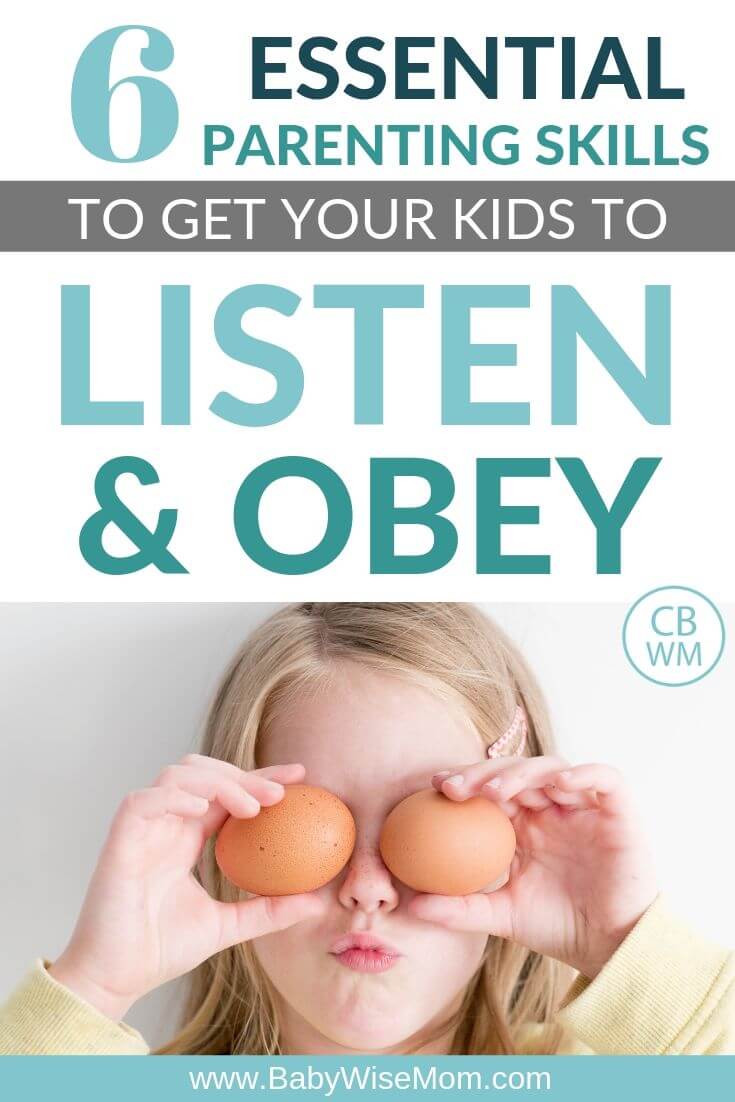There are simple things you can and should do as a parent to get your children to listen to you and obey your instructions and direction.

Here is a list of thoughts I liked from the book Making Children Mind Without Losing Yours. These are thoughts I thought were important that either already have a post dedicated just to them or are self-explanatory enough they don’t need an entire post.
Post Contents
Important Points to Help with Children Obeying
Put Marriage First
Leman discusses the importance of putting your marriage first (page 19). This is something I think most if not all Babywise parents agree with. Leman recommends having a weekly date night. Ideally, you would be able to leave your house to do this. If not, try to have an evening a week that is your date night even if you are home. Rent a movie, play games, even just talking…but have it a special night for the two of you to spend together. Do it after the children are in bed.
Read: Put Your Marriage First
Tantrums
Leman says to handle tantrums, put your child in isolation (40-41). They are free to have their tantrum, but not free to do it around the family. They must do it alone.
Tantrums are done for attention, so once the attention is gone, the tantrum is also. This is what we use time-outs for primarily. If a child cannot control emotions, he or she will be in time out until he or she is done with the fit. Then he or she may return to the family.
Take note that isolation doesn’t need to be the only consequence for the fit. For example, a friend of mine shared with me a story of her 6 year old son and ice cream. Mom made some ice cream sundaes for a Saturday night treat. Her son threw a fit when he saw there were nuts in his ice cream. He didn’t want nuts.
Once he had calmed down, he nicely asked for an ice cream sandwich instead. That request was denied.
My friend shared that had he asked nicely in the first place, she would have been fine with that. But since he threw the fit, he got no dessert.
Tantrums are a very common childhood occurrence, so I have many posts on the topic:
- How To Deal with Toddler Tantrums
- How To Stop a Tantrum
- Frustration Tantrums
- Logical Consequences for Public Tantrums
- When Your Child Has a Tantrum, Stop and Think
- How To Stop a Tantrum by Addressing the Choice Addiction
- Tips for Avoiding and Responding to Tantrums

Honesty
Leman states that if you want to get honesty from your children, you need to be honest (pages 44-45). Children learn by example, and for those young years, you are your child’s number one example.
No one knows more than you. No one is smarter. Umm…at least in your child’s eyes. Be honest at the grocery store when you don’t get charged for something. Be honest when someone calls–don’t pretend you aren’t home. Show your children what integrity is.
Also, when you are honest with your feelings, Leman says that your children trust you more. Be honest about your faults. Your children will learn that people don’t have to be perfect. Be honest about your worries and fears. Your children will see that you have been there; you can understand their feelings.
I had an opportunity to practice this with Brayden recently. My husband called from work with bad news: he was going to have to work all day Saturday for at least 12 hours. The following Sunday was Easter and we were having family over for dinner and a small celebration of Kaitlyn’s birthday. McKenna was barely two weeks old.
I was worried. I was stressed. I was panicked.
I had planned on having my husband around to help prepare things for the gathering, and now he wouldn’t be around. Brayden could tell something was wrong. He asked me repeatedly what was wrong. I told him nothing a few times. He then said, “Mama, what is wrong! Tell me!” So I told him Daddy was going to have to work and I was stressed about getting everything done in time for Kaitlyn’s party all by myself.
Three year old Brayden told me he would help me out. He would help make the cake and get things prepared. It was a sweet gesture. Brayden was much more at ease when he knew the truth from me. Knowing I was stressed didn’t stress him out. He did what he could to help out.
Manners
Like honesty, Leman states that the best way to instill manners in your children is to be the example (page 135). If you want him to say please, you need to say please. You say please to those around you, including your spouse and your children.
He also states that good manners are easiest to instill if you focus on them from a young age. I have discussed this in previous posts, but I have found exemplifying courtesy to be the best teacher. Something I am very good at saying is “Thank You.” I thanked Brayden for everything from his earliest days. I thanked those around me.
When he started talking, he thanked everyone for everything. Adults were shocked to have 12 month old Brayden thank them for things. It was never something I told him to say.
I noticed, however, that he was not good at saying please. After monitoring myself, I noticed I was not good at saying it, either. My tone implied it, but I didn’t say the word. I worked hard to get it into my everyday vocabulary. Kaitlyn grew up hearing both please and thank you from me, and she is very good at saying both. Brayden still needs to be reminded sometimes. I have seen that teaching by example from a young age is the best way to go when teaching manners.
Read: How To Teach Table Manners to Your Child
Reprimanding
Leman states that when your child says or does something discourteous, you shouldn’t reprimand your child in front of that person. You need to take your child to another room or somewhere private and talk to your child about it there, not while there is an audience (page 136).
Belonging
Leman points out that parents need to work to ensure their children feel a sense of belonging in the family. He says that your child will belong somewhere. If he doesn’t belong with the family, he will belong with a peer-group–but he will belong.
Some ideas for helping your child feel like he belongs with the family are to let him have a say in planning family activities and trips, ask their opinions when facing problems in the family, give them work to do at home, and explain reasons for rules (as age appropriate) (pages 161-162).

Parenting Tips
As a bonus, here are a few tips I liked from Making Children Mind Without Losing Yours by Dr. Kevin Leman.
Child Gets Out Of Bed
If and when your child gets out of bed for whatever reason, send him back to his room by himself. He will tuck himself back in (page 144). I liked this thought and have used it ever since I read it. We used to walk Brayden back up to his room when he got out of bed. Now we just send him back to bed. Many times, he gets out of bed for a legitimate reason (like using the bathroom). He still goes back to bed on his own. This way, getting out of bed loses some of the perceived (and received) social benefit for the child. Why get tucked in only once each night when it can be several times?
Read: What To Do When Your Child Gets Out of Bed
Freedom to Fail
Leman states many times you need to give your child freedom to fail (155). This means you let your child make mistakes. Don’t hover. We learn from mistakes. And not only that, we make mistakes our entire lives. If your child spends the first 18 or so years of his life with you making sure he either doesn’t have the opportunity to make mistakes (like forgetting to turn in a paper or study for a test) or doesn’t experience the consequences from those mistakes, then he will experience a harsh reality check when you are no longer around to protect him. Let him make the mistakes while the stakes are low. He will learn from them and learn how to deal with them.
Read: Making Children Mind: Show Love
Don’t Nag
Don’t fall into the trap of reminding your child over and over again to do something (pages 158-159). Create consequences for failure to follow through. Leman uses the example of a pet. Say you are constantly nagging your child to feed the dog. Instead of constantly nagging, tell the child if he can’t take care of the dog, you will have to give the dog to a family who will take care of him. And then the trick is you must follow through.
Choosing Clothes
Leman says that allowing your child to choose his own clothes is a great way to teach about making choices. I agree with this and have often said it myself. Leman’s idea for allowing your child to choose clothes is to have play clothes grouped together, school clothes grouped together, church clothes grouped together, etc. You then allow your child to choose a shirt from the appropriate grouping (page 75). This is something you would do for an older child. You can modify this for younger children as appropriate. And remember to watch freedoms and the choice addiction.
Read: How To Stop a Tantrum by Addressing the Choice Addiction
Conclusion
These six tips can help you in your quest to get your child to obey you and listen the first time. I enjoyed this book. I find Leman’s writing style to be easy to read quickly. He doesn’t take himself too seriously and his writing is funny. I definitely think this book is worth the read. If you own a similar book like Parenting with Love and Logic, you might not find it worth owning. But you will find it worth reading.

